TL:DR
These studies show that eating up to one egg a day doesn’t raise cholesterol much for most healthy people, but eating two or more eggs daily or having conditions like diabetes might slightly increase “bad” cholesterol. The small changes depend on your overall diet, especially how much fatty foods like butter or processed meats you eat.
| Study Title and Year | Effect | Does Egg Consumption Increase Cholesterol? |
|---|---|---|
| Association between Egg Consumption and Cholesterol Concentration: A Systematic Review and Meta-Analysis of Randomized Controlled Trials (2020) | YES | Moderate egg consumption increases LDL-c and the LDL-c/HDL-c ratio, particularly with prolonged intake. |
| Fortified Eggs Did Not Raise Cholesterol in Modest-Sized Cardiology Study (2024) | NO | Fortified egg consumption did not increase cholesterol in this study. |
| Nutritional Viewpoints on Eggs and Cholesterol (2021) | NO | Moderate egg consumption (up to one egg/day) does not increase cholesterol for most; hyper-responders may see increases. |
| Associations of Dietary Cholesterol, Serum Cholesterol, and Egg Consumption With Overall and Cause-Specific Mortality: Systematic Review and Meta-Analysis (2022) | YES | Higher egg consumption slightly increases LDL and total cholesterol, but the effect is modest. |
| Dietary Intakes of Eggs and Cholesterol in Relation to All-Cause and Heart Disease Mortality: A Prospective Cohort Study (2020) | NO | Up to one egg per day doesn’t increase cholesterol; higher intake may slightly raise LDL. |
| Egg and Cholesterol Consumption and Mortality from Cardiovascular and Different Causes in the United States: A Population-Based Cohort Study (2021) | YES | Higher egg consumption slightly increases LDL cholesterol, especially in at-risk groups. |
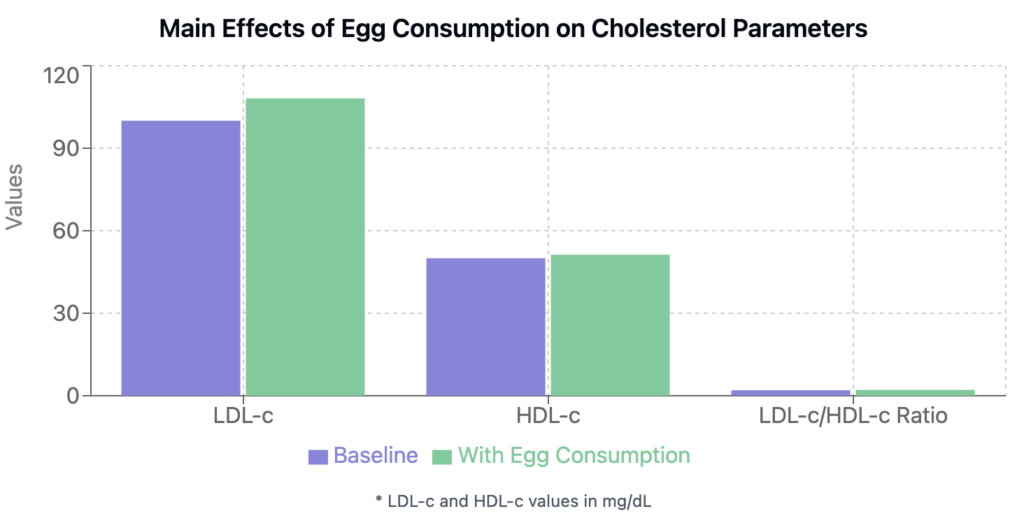
Yes
Moderate egg consumption increases LDL-c and the LDL-c/HDL-c ratio, particularly with prolonged intake.
This paper examines the relationship between egg consumption and cholesterol levels in healthy people through a systematic review and meta-analysis of 17 randomized controlled trials. Here are the key findings in simple terms:
- Increased LDL-c/HDL-c Ratio: People who consumed more eggs showed a significant increase in their LDL-c/HDL-c ratio (by 0.14 on average), which is considered a risk factor for cardiovascular disease.
- Higher LDL Cholesterol: Eating more eggs led to higher levels of “bad” cholesterol (LDL-c), with an average increase of 8.14 mg/dL.
- Minimal Effect on HDL Cholesterol: Egg consumption didn’t significantly increase “good” cholesterol (HDL-c) when looking at all studies combined.
- Duration Matters: Longer consumption periods (more than 2 months) showed stronger effects on cholesterol levels than shorter periods.
- Different Consumption Levels: Two eggs per day significantly increased the LDL-c/HDL-c ratio, while one egg or three or more eggs per day didn’t show statistically significant effects on this ratio.
- Cardiovascular Risk Implications: Since the LDL-c/HDL-c ratio is considered a predictor of cardiovascular disease risk, these findings suggest that people with borderline high cholesterol levels should consider limiting egg consumption.
The researchers note that while eggs are nutritious (containing proteins, minerals, and vitamins), their impact on cholesterol profiles should be considered, especially for people concerned about heart health.
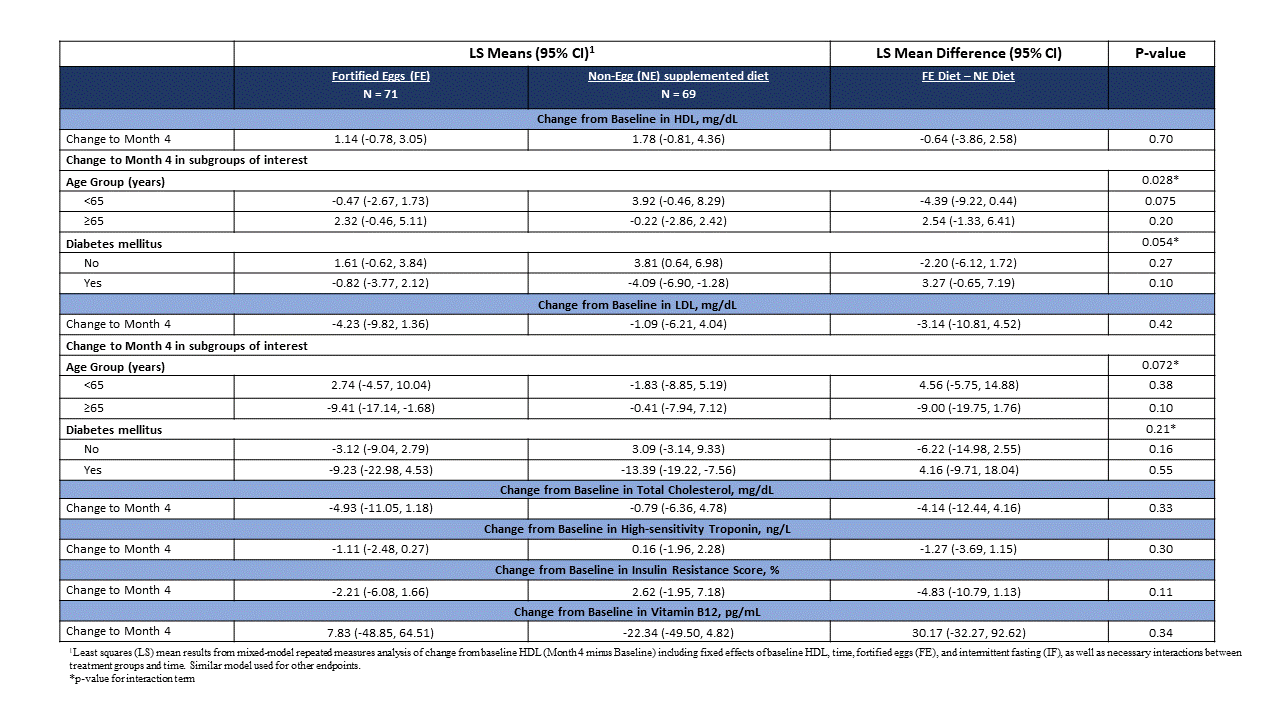
No
This study examined whether fortified eggs (FE) affect cardiovascular health markers compared to a non-egg (NE) diet. Here are the key findings in simple terms:
- Background: Previous studies suggested eggs might negatively affect heart health, but limited data exists. This trial tested fortified eggs against a non-egg diet.
- Study Setup: 140 participants (71 in FE group, 69 in NE group) were randomly assigned to eat either ≥12 fortified eggs/week or no eggs. The average age was 66 years, with 51% women and 24% with diabetes.
- Main Findings:
- Overall, there were no significant differences in cholesterol levels (HDL and LDL) between the groups
- In people over 65, there were some beneficial trends with fortified eggs
- People with diabetes showed potential benefits with fortified eggs
- Decreases in total cholesterol, heart damage markers, and insulin resistance were found in the egg group
- Conclusion: Eating fortified eggs did not negatively affect cholesterol levels. The study suggests possible benefits of fortified eggs for certain biomarkers and subgroups, warranting more research.
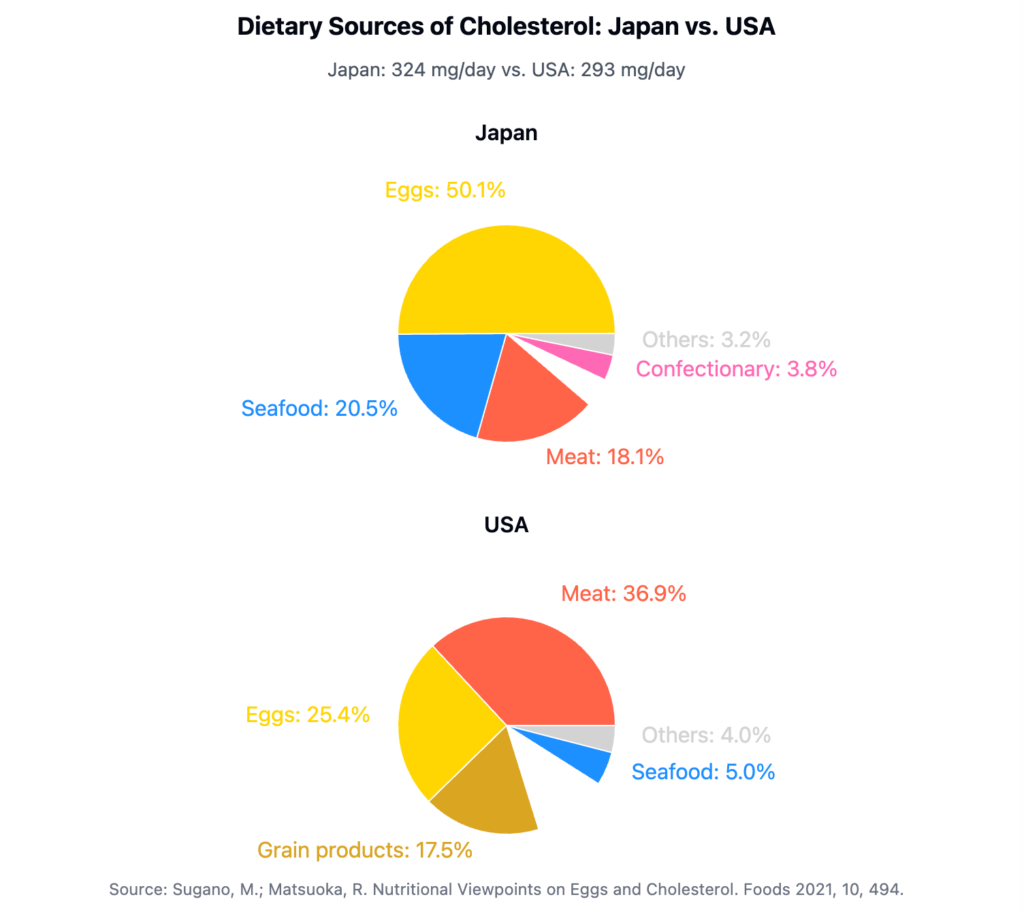
No
This scientific review examines the relationship between egg consumption, cholesterol levels, and cardiovascular disease risk, with a particular focus on comparing Japanese and American populations.
Main Findings
- Daily egg consumption appears safe for most people: Most current epidemiological studies show no significant association between consuming one egg daily and increased blood cholesterol levels or cardiovascular risk.
- Dietary patterns matter: The overall diet is more important than individual foods. Japanese people can consume more eggs with fewer negative effects because their overall diet differs from Americans (less saturated fat, more fish, different cooking methods).
- Food sources of cholesterol differ by country: In Japan, eggs contribute about 50% of dietary cholesterol, while in the US, meat is the largest contributor (37%), followed by eggs (25%).
- Individual responses vary: Some people are “hyper-responders” whose blood cholesterol increases more with dietary cholesterol intake. Personal consideration is needed.
- Eggs have nutritional benefits: Eggs contain nutrients that may interfere with cholesterol absorption and provide health benefits, including protein, vitamins, and antioxidants.
- Type 2 diabetes connection varies by population: In US studies, higher egg consumption is associated with increased diabetes risk, but this relationship is weaker or absent in Asian and European populations.
- Long-term randomized controlled trials are needed: Current evidence suggests eggs are a healthy and cost-efficient food worldwide, but more research is necessary.
Practical Implications
- Consuming one egg daily is likely safe for most healthy people, especially those without diabetes or hypercholesterolemia
- The nutritional benefits of eggs (protein, vitamins, minerals) make them valuable, especially in developing countries
- Overall dietary pattern matters more than individual foods like eggs
- Focus on limiting saturated fats and increasing fruits, vegetables, whole grains, and fiber
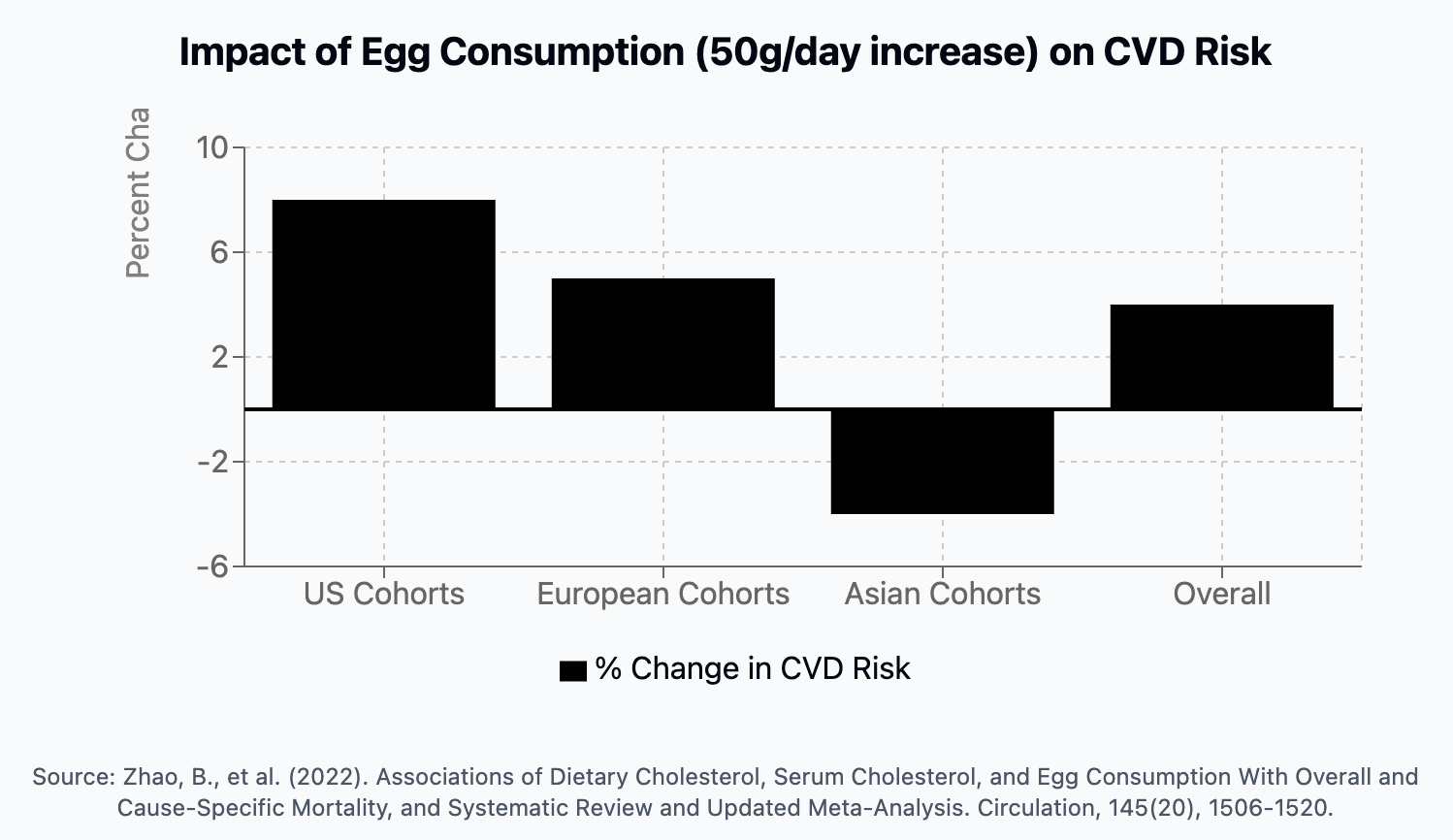
Yes
This paper presents a comprehensive analysis examining the relationships between dietary cholesterol, serum (blood) cholesterol, egg consumption, and mortality risk.
Main Findings
- Dietary Cholesterol and Mortality Risk: People who consumed more dietary cholesterol (300mg more per day) had a 10% higher risk of death overall and a 13% higher risk of death from cardiovascular disease (CVD).
- Egg Consumption and Mortality Risk: Eating more eggs (50g or about one egg per day) was associated with a 6% increased risk of overall death and a 9% increased risk of death from cardiovascular disease.
- Blood Cholesterol and CVD Risk: Higher levels of total cholesterol in the blood were linked to a 14% greater risk of dying from cardiovascular disease.
- Geographic Differences: When analyzing studies from different regions, the researchers found that egg consumption was linked to increased cardiovascular disease risk in US studies (8% higher), slightly increased risk in European studies (5% higher), but showed no significant association in Asian studies.
- Mechanism: The association between egg consumption and mortality appears to be primarily due to the cholesterol content of eggs, as the relationship weakened when researchers adjusted for dietary cholesterol.
Study Details
- The research analyzed data from 27,078 Finnish men followed for 31 years
- They also conducted a meta-analysis of 41 prospective cohort studies including over 3.6 million participants
- The participants in the Finnish study had relatively high cholesterol intake (average 582mg daily) compared to the US average (293mg)
- The study controlled for many factors including age, body mass index, smoking, blood pressure, and other dietary components

No
Whether eating eggs and dietary cholesterol affects death rates.
Egg Consumption Findings
- No significant link between egg consumption and death: The study found that eating up to 1 egg per day was not associated with higher risk of death from any cause or from heart disease specifically.
- Safe in moderation: This supports current dietary guidelines that suggest eggs can be part of a healthy diet.
Additional Insights
- The study used data from over 37,000 US adults followed for about 8 years.
- Different groups showed different patterns – for example, men and women showed opposite associations with egg consumption.
- People with high blood cholesterol levels might need to be more careful about egg consumption.
This study suggests moderate egg consumption (up to 1 per day) is fine for most people, but very high cholesterol intake may increase health risks.
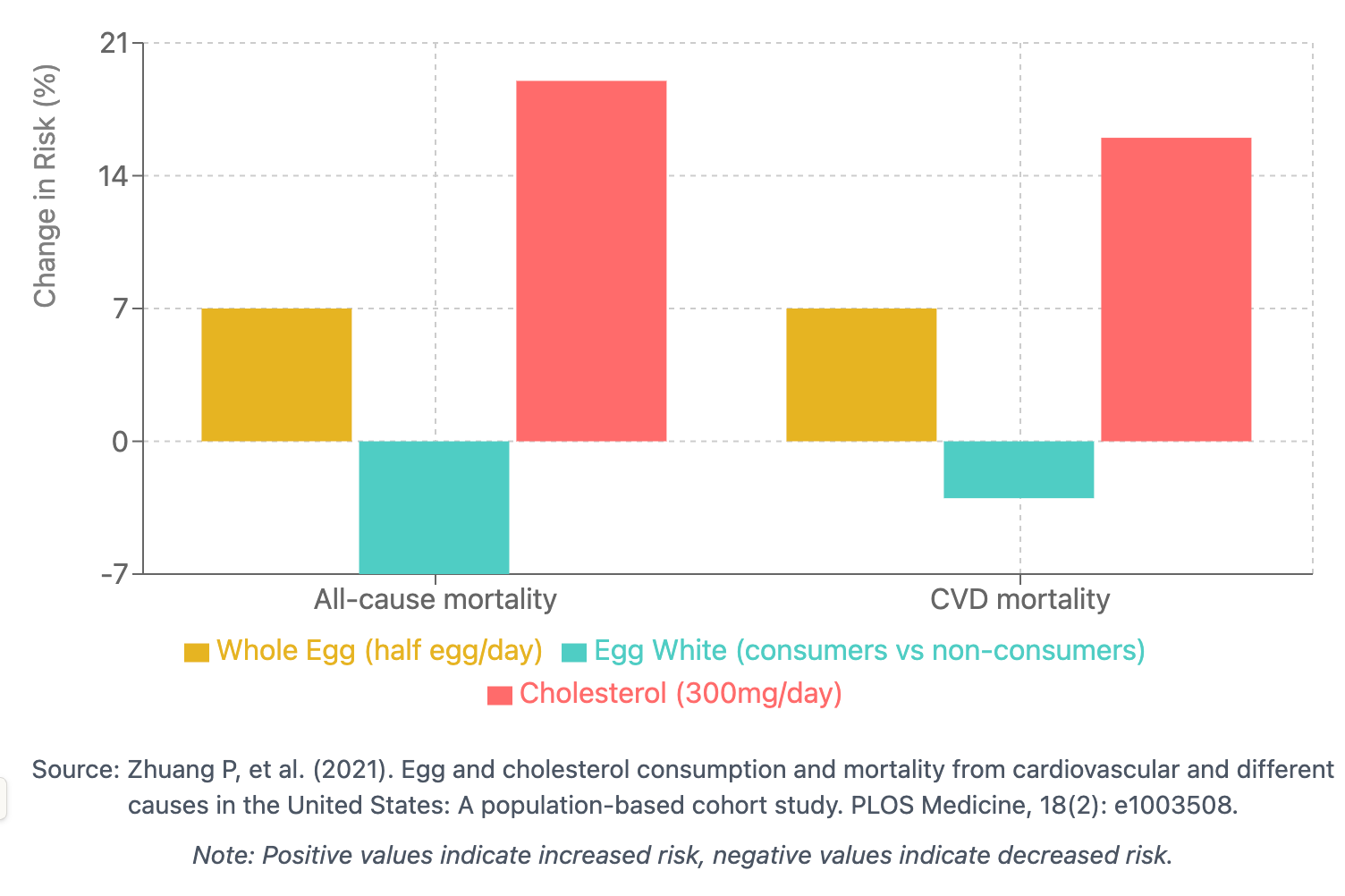
Yes
Relationship between egg consumption, dietary cholesterol, and risk of death from various causes.
Main Findings
- Eggs and mortality risk: The study found that consuming more whole eggs was associated with higher risk of death from all causes, cardiovascular disease, and cancer. Each additional half egg per day was linked to a 7% higher risk of death.
- Cholesterol is the culprit: The cholesterol content in eggs appears to be largely responsible for the increased mortality risk. Each additional 300 mg of dietary cholesterol per day was associated with a 19% higher risk of death from all causes.
- Egg whites are better: Unlike whole eggs, egg white/substitute consumption was associated with lower mortality. People who consumed egg whites had a 7% lower risk of death compared to non-consumers.
- Substitution benefits: Replacing half a whole egg per day with equivalent amounts of egg whites/substitutes or other protein sources (like poultry, fish, dairy products, or nuts/legumes) was associated with lower mortality risk.
Study Details
- This was a large study that followed 521,120 Americans aged 50-71 years for about 16 years.
- During the follow-up period, there were 129,328 deaths.
- The study adjusted for many factors like age, sex, race, education, income, smoking, alcohol consumption, physical activity, and various health conditions.
Practical Implications
The researchers suggest that limiting cholesterol intake and replacing whole eggs with egg whites/substitutes or other protein sources may be beneficial for long-term health. They note that current dietary guidelines recommend eggs as part of a healthy diet without an upper limit on cholesterol intake, which might need reconsideration.
